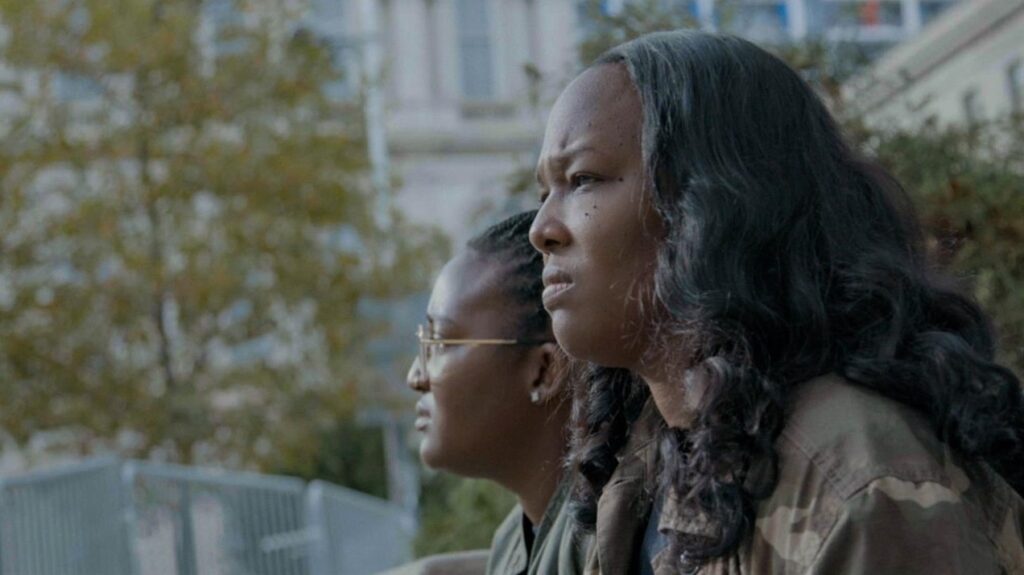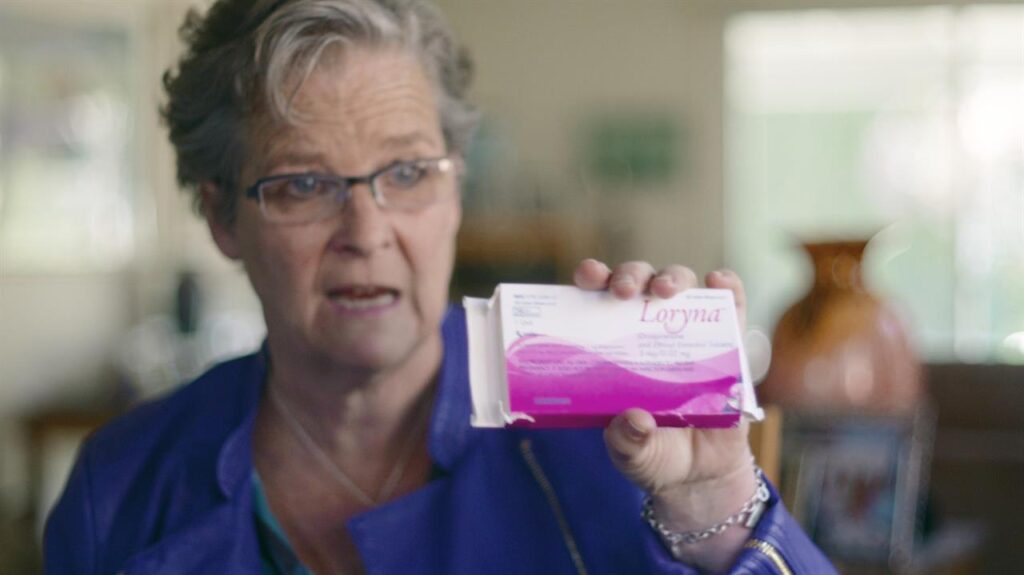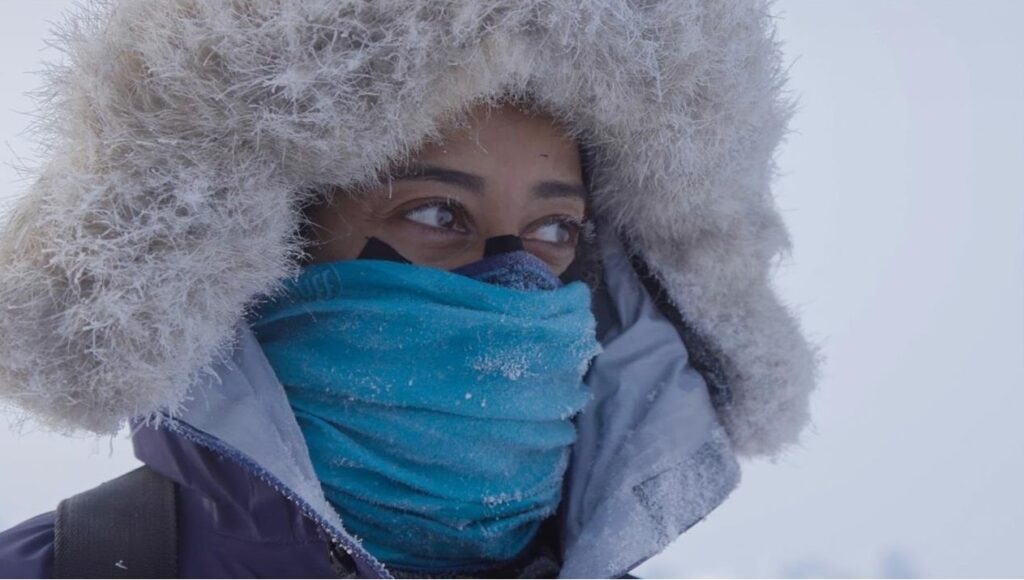DOC NYC 2021 is kicking off today, November 10. The documentary film festival will feature in-person events through November 18 and online screenings through November 28. Women and Hollywood has begun publishing interviews with women and nonbinary directors showing feature films at the fest. We’re also highlighting some of our most anticipated titles.
There are plenty of docs we’re excited to see, “The Slow Hustle” and “Be My Voice” among them. The former, from “The Wire” alumna Sonja Sohn, examines corruption in Baltimore Police Department’s Gun Trace Task Force. The latter, directed by Nahid Persson, is a portrait of Iranian women’s rights activist Masih Alinejad. We’re also psyched for DOC NYC’s special preview of the docuseries “Black and Missing.” From the all-women of color directing team of Geeta Gandbhir, Nadia Hallgren, Samantha Knowles, and Yoruba Richen, it focuses on systemic racism’s effect on missing persons cases, and the sisters-in-law working to raise awareness around the issue.
Below, find some of the DOC NYC 2021 films we’re most looking forward to. Synopses are courtesy of the festival.
“The Slow Hustle” – Directed by Sonja Sohn

“The Slow Hustle”
What it’s about: For years, the Baltimore Police Department’s Gun Trace Task Force ran roughshod through the city’s most vulnerable communities under the guise of getting guns off the streets. When veteran detective Sean Suiter is found dead on duty under dubious circumstances, the corruption within the unit is revealed to reach into the greater political structure of the city. Director Sonja Sohn, of “Baltimore Rising” and HBO’s “The Wire,” takes an exacting look into the festering underbelly of one of Baltimore’s most maligned institutions and the individuals that took a stand to stop the injustice.
Why we’re excited: No stranger to the Baltimore Police Department, Sonja Sohn is best known for portraying Detective Kima Greggs on “The Wire,” a West Baltimore-set HBO crime drama that never turned a blind eye to police corruption. She’s gone on to appear in series such as “The Chi,” “Luke Cage,” and “The Originals.” The multi-hyphenate has also been busy behind the camera, making her directorial debut with 2017 doc “Baltimore Rising,” a portrait of activists, police officers, community leaders, and gang affiliates in the wake of Freddie Gray’s death in police custody.
With “The Slow Hustle,” Sohn returns to Baltimore, digging even deeper into the rotting roots of corruption within the city’s police department. Stories highlighting the gross injustices perpetuated by those entrusted to protect and serve are becoming more common, both on-screen and off, and films like “The Slow Hustle” help bring attention to urgent, widespread problems that have persisted unchecked for far too long. We’re eager to learn more about the particular circumstances surrounding Sean Suiter’s death, but also about the broader picture the doc paints.
“A Tree of Life” – Directed by Trish Adlesic; Written by Trish Adlesic and Eric Schuman
What it’s about: In Pittsburgh in 2018, a white supremacist opened fire at the Tree of Life Synagogue in the deadliest anti-semitic attack in American history. The survivors recount the harrowing experience and detail how their lives have fundamentally changed. Academy Award nominated, Emmy-winning director Trish Adlesic confronts the “moral decay of humanity” and takes a larger look at the hate-based crisis stemming from the political climate to pose the ultimate question: what kind of nation does America want to be?
Why we’re excited: Like the best docs, Trish Adlesic’s “A Tree of Life” promises to place its subject, the October 2018 shooting at Tree of Life Synagogue, in a larger context. In addition to being a tragedy and heinous act of anti-Semitic violence, the shooting is also one link in the growing chain of white supremacist hatred, brutality, and gun violence in the United States. In an interview with Women and Hollywood, Adlesic told us “it was hard to imagine how the outlook for the American promise of ‘liberty and justice for all’ could be any more bleak” after the Tree of Life shooting. She continued, “And yet, since the start of 2021 we’ve seen a deadly white supremacist attack on the U.S. Capitol, systemic efforts to disenfranchise BIPOC voters as part of a strategy to further encode racist and discriminatory policies and institutions in American life, and 711 mass shootings.”
As devastating as it was, the Tree of Life shooting was not an anomaly or a one-off: it’s just an example of what America is today. “A Tree of Life” looks to be a hard watch, but a necessary one if we as Americans want things to be better for everyone.
“Be My Voice” – Directed by Nahid Persson

“Be My Voice”: DOC NYC
What it’s about: Journalist and activist Masih Alinejad is the voice of millions of Iranian women rebelling on social media against the forced use of the hijab. Exiled in the United States, Masih uses her freedom to lead one of the largest acts of civil disobedience in today’s Iran and amplify the protest in her home country. Filmmaker Nahid Persson (“Prostitution Behind the Veil,” “The Queen and I”) follows Masih as her courage is tested when violence and oppression threaten her own family members.
Why we’re excited: Before learning about Masih Alinejad, Nahid Persson had “almost lost hope of a change in Iran and had stopped making films about Iran.” But she was “reenergized” by Alinejad and the women fighting Iran’s mandatory hijab rule. “I feel like it’s my responsibility as a documentary filmmaker to help and make their voices heard internationally,” Persson told us.
“Be My Voice” seems to be a primer on the current situation for women in Iran and Alinejad’s activism, and an example in itself of how to overcome current events fatigue and make a difference. Persson felt helpless in the face of the treatment of women in Iran — a feeling many of us are very familiar with in 2021 — yet was inspired enough by Alinejad and her allies to make a film. She was galvanized to fight, and with “Be My Voice,” is in turn galvanizing others. That’s Persson’s goal, anyway: “I want people to get more involved with their fellow human beings,” she said. “It would be fantastic if audiences share what they see in this movie on their social media platforms, and encourage your friends to watch the movie. In that case each of us can be the voice of Iranians.”
“Exposure” – Written and Directed by Holly Morris
What it’s about: As the Arctic polar ice cap melts, an expedition of women from East and West sets the audacious goal of skiing to the North Pole. Filmmaker Holly Morris and an all-women crew document this daring and unprecedented group as they navigate everything from frostbite and polar bear threats, to sexism and self-doubt in an intimate story of resilience, survival, and global citizenry — in what may be the last-ever over-ice expedition to the top of the world.
Why we’re excited: Frankly, “Exposure” sounds badass. Besides depicting an epic, high-stakes adventure that promises to be thrilling and visually stunning, the doc is also drawing attention to climate change. And the woman-led expedition is also being chronicled by an all-women crew.
There’s a scarcity of stories about women in the outdoors, a void that titles like Reese Witherspoon-starrer “Wild” and “Playing with Sharks,” Sally Aitken’s portrait of ocean explorer Valerie Taylor, are helping to fill. “I believe that when women come to fully believe in ourselves, especially in action and outdoors, it can be catalytic,” director Holly Morris told us in an upcoming feature. “We can take the reins, work across boundaries of all kinds, and lead a way into a future where we adapt, with compassion and equity, to the changing climate. Ideally, these are some of the things folks are thinking about after they watch the film.”
“The Business of Birth Control” – Directed by Abby Epstein

“The Business of Birth Control”
What it’s about: There can be no real gender justice without an unpacking of the power structures surrounding the reproductive health industry complex — and of the choices that the market pushes on women. Abby Epstein’s latest documentary highlights the dark history of eugenics and underfunded research that the birth control pill, often heralded as a feminist turning point in the history of reproductive rights, hides within itself.
Why we’re excited: We all have anecdotal horror stories about hormonal birth control, whether the source is a friend, family member, or ourselves. Who hasn’t heard — or experienced first-hand — what it can do to mental health and the physical changes it can cause? But it’s also been a godsend, saving an untold number of people from experiencing unwanted pregnancies, and used as treatment for myriad other issues, including painful periods and acne.
In a soon-to-be published interview with us, director Abby Epstein described the film as “a hard look at the lack of options and informed consent around hormonal birth control.” So often hormonal birth control, and specifically the pill, is treated as the default choice, the only choice, when it comes to preventing pregnancy, and its potential side effects aren’t mentioned, let alone detailed, by those prescribing it. We’re hopeful that “The Business of Birth Control” explores why this is the case, and reminds folks that other options exist should they be interested in pursuing them.
“Black and Missing” (Docuseries) – Directed by Geeta Gandbhir, Nadia Hallgren, Samantha Knowles, and Yoruba Richen

“Black and Missing”: DOC NYC
What it’s about: Sisters-in-law Derrica and Natalie Wilson dedicated their lives to locate Black people who are missing by bringing awareness to their cases, which have often been marginalized by law enforcement and traditional media. DOC NYC will preview one episode of the upcoming four-part HBO series about their work that was created by Soledad O’Brien and Geeta Gandbhir. We watch as the Wilsons use their experience to put the mother of the missing Michelle Green on “The View,” prompting a tip that leads to a hopeful turn in the case.
Why we’re excited: “Black and Missing” is the rare story that features women of color leaders on both sides of the camera. The docuseries boasts Geeta Gandbhir, Samantha Knowles, Nadia Hallgren, and Yoruba Richen as its directors, and centers Black women activists, sisters-in-law Derrica Wilson and Natalie Wilson, as its subjects.
Through their work, the Wilsons are addressing an infuriating truth about the criminal justice system: the disappearances of people of color, Black people in particular, are not allotted the same resources, attention, or care as white missing persons cases. As Gandbhir and Knowles explained to Women and Hollywood, this is both an evergreen, and extremely timely, issue: “There are so many past examples of missing white women who go missing and get an enormous response from the media, and thus the police: Natalie Holloway, Chandra Levy, Elizabeth Smart, etc.,” they said. “Recently Gabby Petito went missing and we saw everything at the heart of our series play out in real time — a young, pretty white woman tragically vanishes, a media cycle that revolves around her disappearance, a nation obsessed with finding her, and both local and federal law enforcement rapidly mobilized to find her. The result was the recovery of a body within weeks, which every missing person deserves.” The directors emphasized, “We just want the same kind of robust care when black people and people of color go missing – that’s what we want the audience to reflect on after they watch.”
“Be Our Guest” – Directed by Diane Tsai
What it’s about: Amid the opioid crisis in their small New Hampshire town, Lydia O’Leary and her family open their home to those recovering from addiction. As Lydia’s altruism grows, her children assess their unconventional home life while yearning for a normal adolescence. Emboldened by the camera, the children open up about hardships, including negotiating physical and emotional spaces with adult roommates. Diane Tsai’s feature debut sensitively captures a complicated balance of community, independence, and a family’s love.
Why we’re excited: Described by Diane Tsai as “a film about radical generosity, and what is possible when you are determined to make a difference in someone else’s life,” “Be Our Guest” tells a story we haven’t seen before. We’re looking forward to hearing from Lydia O’Leary’s four children and learning about how their experiences of living with complete strangers have shaped them. As Tsai told us in a soon-to-be-published interview, “Every year, [Lydia] asks her kids: ‘Are you willing to give up a year of your life, so that someone can have the rest of their life?’ Their annual commitment results in an unconventional lifestyle that pushes them all to reconsider the meaning of community, independence, and altruism.” Are they at all resentful about sharing their home? Are they committed to keeping their doors open indefinitely, continuing the tradition even when they have homes of their own, or do they dream of a future with locks? How have their experiences at home shaped their worldviews?
We’re interested to learn more about O’Leary — and what inspired her to take such dramatic action to support those recovering from addiction — and her guests. How do they feel about living with the family, and what have their experiences been like?
“InHospitable” – Directed by Sandra C. Alvarez
What it’s about: Why are healthcare costs so high in the United States? Part of the problem lies with the business of hospitals, even those running as nonprofits. “InHospitable” follows patients and activists as they band together to fight a multi-billion dollar nonprofit hospital system in Pittsburgh that limits vital care for vulnerable patients. Filmmaker Sandra Alvarez explores the perspectives of patients, hospital workers, advocates, and politicians to shed light on an overlooked fight for justice.
Why we’re excited: Most people in the U.S. would probably agree that the healthcare system is flawed at best, broken at worst. There is also a general consensus that those responsible for this mess include insurance companies, Big Pharma, and apathetic lawmakers. Sandra C. Alvarez’s doc focuses on another, often overlooked, piece of the puzzle, one we tend to think of as a neutral, or even benevolent, entity: hospitals. As Alvarez puts it, “InHospitable” spotlights “how hospitals in the U.S. have become a big business, and how we the patients, hospital workers, and surrounding communities are collateral damage.”
By following the lawsuit against University of Pittsburgh Medical Center, the film breaks down a significant component of the healthcare crisis for its audience. The fact that hospitals function as businesses might be news to some viewers, but “InHospitable” makes the case that it’s an issue that affects all of us, and must be addressed.







